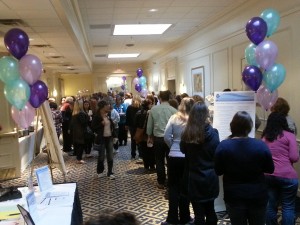Guest Blogger: Kathryn Biel
I’ve had that moment lately. I’m not proud to admit it. Every few years, I work with a student who makes me feel this way. I have no idea what I’m doing with and for the student. Before you go judging me, stop and think if you’ve ever felt this way. For me, it’s with severely autistic students. The kids who can walk and move around. In my experience, they’re usually pretty strong, which we all note as they’re hitting and kicking and throwing objects.
My usual way of thinking doesn’t work, and I’m at a loss for what to do.
My role is to ensure safe and efficient access to the educational process. One of the challenges with working with moderate to severely impaired people with autism is breaking through, and assigning intrinsic value to an extrinsic idea. Lots of time, I get these kiddos with goals to improve ball handling skills. I had one student once that we worked on this goal for a number of years. Finally, I said to the parent, “I can throw a ball at him for 24 hours a day, 7 days a week. Until it matters to him, we’re not going to see significant improvement in his throwing skills.” Perhaps a crude way to put it, but it was the truth. Improving ball handling skills was important to the parent, not the student. Finding what matters to the student is what challenges me.
I can often address stair climbing skills as it is such a rote skill, especially when paired with counting that it becomes ingrained quickly, providing the necessary strength and range of motion are present. After that, I struggle. Why is it important to the student that he or she stands on one foot? While these measurable skills are often delayed or lacking as compared to same-aged typical peers, often their balance is functional.
I find it challenging to increase the movements and activities in the student’s repertoire. They like what they like and they don’t like new things. This, however, can lead to secondary impairments as the child ages, especially when combined with a diet lacking in variety, as is often seen. Motivating a student to move is one thing. Motivating an overweight student to move becomes entirely more difficult.
Then, there’s toe walking. How aggressive are we being in treating it? Are we letting it occur (while monitoring range of motion) to provide sensory input? Is toe-walking alone an impairment that restricts access to the educational environment?
I struggle with working with the student who flits from object to object, activity to activity, never quite getting the functional use out of anything. These 30 minute sessions drain me, and as much as I like the child, I am filled with dread when I think about them. I know that any “plan” I make is likely to be tossed out the window as soon as the session starts. Do I just follow the child’s lead and try to make functional what I can? Do I engage in a battle of wills in order to get the student to do what I want him or her to do? I know what I’m supposed to be working on. I know why it’s functional. But my student doesn’t. How do I help my student become invested in what I am trying to work on? How important is it that I make this already challenging student faster and stronger and more agile? What do I need my student to be able to do to be functional? Am I looking at functional for the whole world or functional for his or her world?
If you’ve ever felt lost, or wanted to know what motor skills we should be working on for our students with Autism, check out Kym Doherty’s presentation, Addressing Motor Issues in Autism: What’s Realistic and Relevant? at the Sixteenth Annual Therapies in the School Conference.
~Kathryn Biel, PT, DPT
]]>





